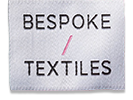Sustainability
UN goals
We are all about the tailored supply chain that saves waste and we align ourselves with goal number 12 of the UN Global Goals – responsible consumption and production. We love what we do but we don’t believe it should have a cost.
Factories
- We source, develop and deliver 100,000s of purpose lead, unique textile items around the world each year. We have a trusted, tried and tested network of 46 personally visited factories from the UK to Asia that supply niche, ethical, expertise and manufacture for us.
- From small, bespoke orders made in the UK to vast-volume factory facilities and mills in Asia, we offer a flexible, fresh approach to design and fulfilment.
The ways Bespoke Textiles practice sustainability
- We only work with family-based businesses or SEDEX approved suppliers that treat their staff really well.
- Wherever possible we use left-over stock fabrics for small repeat orders.
- We always try to encourage our clients to choose quality materials and timeless designs that last well.
- We personally seek out organic recycled and naturally made materials as better alternatives whenever we can.
- Many other factories use recycled water sustained by their own well to wash and dry their materials in a more environmentally friendly way.
- One of our factories weaves its fabrics using waterjet energy and uses airjet energy to power the weaving machines.
- Choosing to use recycled materials can sometimes have a greater impact on the environment because of the vast amount of chemicals needed to recycle the fibres to be re-woven again, so it’s not always sound ecosystem to choose recycled.
- We make everything to an outstanding quality, built to last.
- For some of our silks, jersey and pashmina products, our suppliers use AZO-free dyes.
- We only work with an overseas factory if it can provide a different niche of product that we can’t do sustainability in the UK, or have a better vertical set up of gathering resources locally to them.
- Using a blend of polyester and cotton fibres actually means we can save on water use. We are also recycling as polyester is a byproduct of recycling waste from the petroleum industry, therefore making a more sustainable material that can last, especially in heavy-use products like uniforms.
- We choose to be aligned with the sustainable UN Global Goals number 12, which concerns responsible consumption and sustainability.
- We personally love vintage and recycles and customise all our textile finds to repurpose them for another life.

